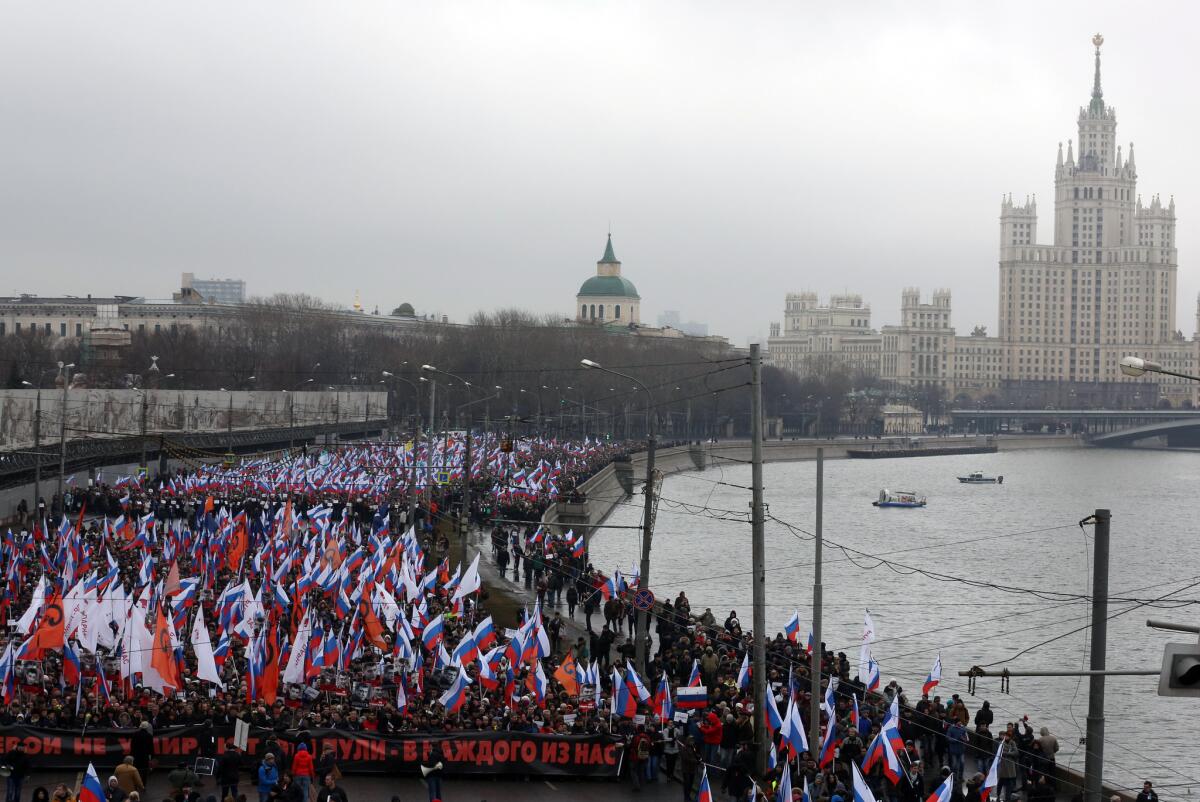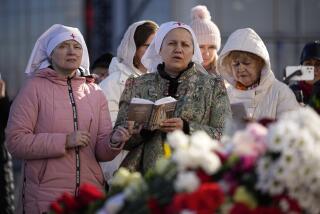Chanting, ‘We’ll not forget,’ Russians mourn slain Kremlin critic Boris Nemtsov

- Share via
Reporting from Moscow — At least 20,000 people marched through the icy drizzle of central Moscow on Sunday to pay respects to slain Kremlin critic Boris Nemtsov, whose Friday night gangland-style shooting on a bridge near Red Square shocked Russia’s beleaguered opposition and the democratic world.
The procession that Nemtsov had helped organize as a protest against Russian President Vladimir Putin’s policies in Ukraine was repurposed after his killing as a mourning ritual for one of the last politicians willing to fearlessly denouncing the autocratic leader.
Carrying flowers, Russia’s tricolor flag and portraits of the slain 55-year-old Nemtsov, who rose to the office of first deputy prime minister in the 1990s, the mourners chanted, “We’ll not forget. We’ll not forgive.” They carried a banner reading: “These bullets are for all of us!”
As the marchers approached the domes of St. Basil’s Cathedral, a Moscow landmark, they chanted: “Putin is a murderer,” “Putin should go to jail,” and “Russia without Putin!”
Nemtsov in recent months had often traveled to Ukraine, reportedly to gather evidence of Kremlin involvement in the war that has wracked the neighboring country for nearly a year. Putin has steadfastly denied that Russian arms or troops are being funneled to the separatists occupying two large regions of eastern Ukraine, but NATO satellite imagery and captured Russian soldiers have undermined those claims.
Ukrainian President Petro Poroshenko and Nemtsov’s fellow opposition party leader Ilya Yashin said after Nemtsov’s slaying that he was about to publish a stinging report presenting evidence of Russia’s military involvement in the conflict.
The marchers defied the Putin leadership’s characterization of Poroshenko’s government as anti-Russian “fascists” with cries of: “Friends are in Kiev. The fascists are in the Kremlin.”
Nemtsov was walking home from a late dinner with a Ukrainian friend when he was gunned down just before midnight Friday as he walked onto the Bolshoi Moskvoretsky Bridge across the Moscow River from the Kremlin embankment.
Six shots were fired from a Soviet-made Makarov handgun, four of them striking Nemtsov in the head and torso. The gunmen fled the scene in a white sedan that was later found miles away, according to initial reports from investigators.
Russia’s Sputnik news agency reported Sunday that authorities are looking for a man of average height with short hair. Security cameras in the area of the killing reportedly picked up images of the shooter, said to have been wearing jeans and a brown sweater.
The Russian Investigative Committee, one of the federal agencies Putin has deployed on a stated mission to find and punish the killers, has advanced several theories about who might have been behind the slaying, which bore the hallmarks of a contract killing. The theories range from a Muslim fundamentalist strike to foreign intrigue to destabilize Russia, but make no mention of the possibility of Kremlin involvement.
As the committee officially offered a reward of just under $50,000 for information shedding light on the killing, Moscow’s TVC television network ran street camera footage said to show the killer running out from behind a parked snow-removal truck to confront Nemtsov on the bridge sidewalk. There was no snow on the bridge Friday night, raising suspicions about why the snow plow would have been parked there.
The security camera footage appeared to show the gunman being picked up by a passing car after shooting Nemtsov. The friend accompanying Nemtsov, who has been identified by media in Kiev as 23-year-old Ukrainian model Anna Duritskaya, was being questioned by investigators, said a statement posted Sunday on the Investigative Committee’s official website.
Nemtsov was a leader of an opposition coalition uniting other former government officials and had been instrumental in organizing protests against Putin when he ran for reelection as president three years ago. He was also the author of a highly critical expose on corruption surrounding last year’s Russian hosting of the Winter Olympic Games.
Organizers of the protest-turned-memorial said they were satisfied with the turnout, the size of which was difficult to pinpoint. Some claimed more than 50,000 took part, while police put the figure at 16,000.
“Of course many people are scared about what is happening in the country these days,” Yashin said in an interview as he walked with the massive crowd. “The impressive size of the march gives us hope that one day we may live in a country not engaged in war and aggression against its neighbors and where people can feel safe and free.”
The death of Nemtsov consolidated the ranks of the opposition, whose leaders had been locked in conflicts and squabbles with one another in recent months about what strategy to pursue to oppose “the Kremlin’s ruinous policies,” Yashin said.
The march proceeded peacefully and no clashes with the police were reported. Police generally kept a low profile, although two police helicopters hovered in the gray sky overhead and three police boats patrolled nearby in the Moscow River.
The number of people willing to publicly show their defiance proves that the Kremlin has failed to instill fear in the hearts of many, said Georgy Satarov, a former advisor to the late President Boris Yeltsin and an associate of Nemtsov.
“When the ranks of the protesters eventually swell to over 300,000, they may start dictating their demands to the Kremlin,” added Satarov, president of the INDEM think tank in Moscow.
Pro-Kremlin analyst Dmitry Orlov, however, ruled out a scenario akin to Ukraine’s violent Maidan uprising last year that drove Kremlin-allied President Viktor Yanukovich to flee the country.
“The peaceful nature of the march today demonstrated that the Russian opposition, in contrast to their Ukrainian colleagues, are much more balanced and reasonable,” said Orlov, head of the Agency for Political and Economic Communication. “Of course there are forces who want to destabilize the situation in the country, but they are not influential and don’t enjoy support among the public at large.”
Economist Gavriil Popov, a former democratic movement leader and the first mayor of post-Soviet Moscow, called in an essay published in the popular Moskovsky Komsomolets newspaper to rally around Putin, saying the killing of Nemtsov was a provocation aimed at discrediting the Kremlin leader.
Many protesters, however, blamed Putin for at least creating the atmosphere in which an opposition leader could be gunned down in the shadow of the Kremlin.
“Putin publicly accused Nemtsov of being one of the leaders of the so-called ‘Fifth Column’ of national traitors, and some radicals must have interpreted his charge as a direct order for attack,” said Anton Lebedinsky, a 30-year-old Moscow aviation engineer. “No matter how much the Kremlin propaganda machine tries to present Nemtsov as a victim of Ukraine’s or Western special services, it is clear to me and my friends that Nemtsov was killed by this propaganda machine.”
Ukrainian lawmaker and Nemtsov friend Alexei Goncharenko, who came to Moscow to take part in the march, was arrested by Moscow police in connection with his alleged involvement in riots in the Black Sea port of Odessa last year in which several dozen pro-Russia activists were killed, the Russian Investigative Committee said.
Goncharenko became the second Ukrainian lawmaker held in Russian custody. The first was Nadezhda Savchenko, a former Ukraine air force pilot reportedly abducted and smuggled across the Russian border last June to face charges of complicity in the murder of two Russian television journalists during the fighting in eastern Ukraine.
Savchenko has been on a hunger strike for close to three months now in protest of her detention, her lawyers said.
Nemtsov had more than once publicly demanded Savchenko be released.
Special correspondent Victoria Butenko in Kiev and Times staff writer Carol J. Williams in Los Angeles contributed to this report.
More to Read
Sign up for Essential California
The most important California stories and recommendations in your inbox every morning.
You may occasionally receive promotional content from the Los Angeles Times.










